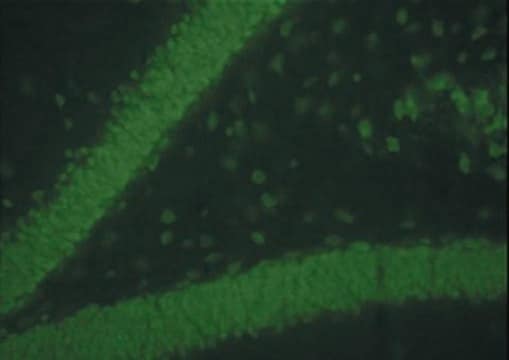AB1584
Anti-c-Fos Antibody
Chemicon®, from sheep
Synonym(s):
G0/G1 Switch Regulatory Protein 7
About This Item
Recommended Products
biological source
sheep
Quality Level
antibody form
purified immunoglobulin
antibody product type
primary antibodies
clone
polyclonal
species reactivity
rat
manufacturer/tradename
Chemicon®
technique(s)
immunohistochemistry (formalin-fixed, paraffin-embedded sections): suitable
western blot: suitable
NCBI accession no.
UniProt accession no.
shipped in
wet ice
target post-translational modification
unmodified
Gene Information
human ... FOS(2353)
General description
Specificity
Immunogen
Application
Recommended fixation is 4% PFA with 0.5% picric acid {Li et al 1999}; triton X-100 pretreatment in the block only; antigen retrieval for paraffin sections is recommended. Microwave citric acid treatment suggested.
Western blot: 10 μg/mL. Detects a band at approximately 55 kDa.
Optimal working dilutions must be determined by the end user.
Epigenetics & Nuclear Function
Transcription Factors
Target description
Physical form
Storage and Stability
Avoid repeated freeze/thaw cycles.
During shipment, small volumes of product will occasionally become entrapped in the seal of the product vial. For products with volumes of 200μL or less, we recommend gently tapping the vial on a hard surface or briefly centrifuging the vial in a tabletop centrifuge to dislodge any liquid in the container′s cap.
Analysis Note
Widely expressed
Other Notes
Legal Information
Disclaimer
Not finding the right product?
Try our Product Selector Tool.
recommended
Storage Class Code
10 - Combustible liquids
WGK
WGK 1
Flash Point(F)
Not applicable
Flash Point(C)
Not applicable
Certificates of Analysis (COA)
Search for Certificates of Analysis (COA) by entering the products Lot/Batch Number. Lot and Batch Numbers can be found on a product’s label following the words ‘Lot’ or ‘Batch’.
Already Own This Product?
Find documentation for the products that you have recently purchased in the Document Library.
Customers Also Viewed
Our team of scientists has experience in all areas of research including Life Science, Material Science, Chemical Synthesis, Chromatography, Analytical and many others.
Contact Technical Service








